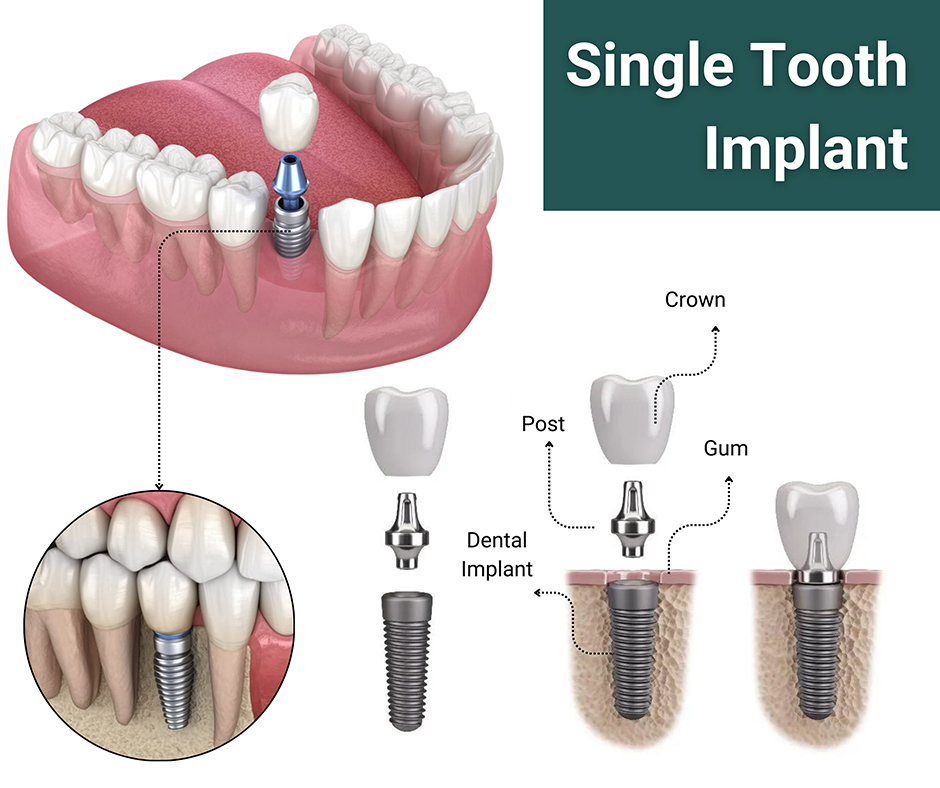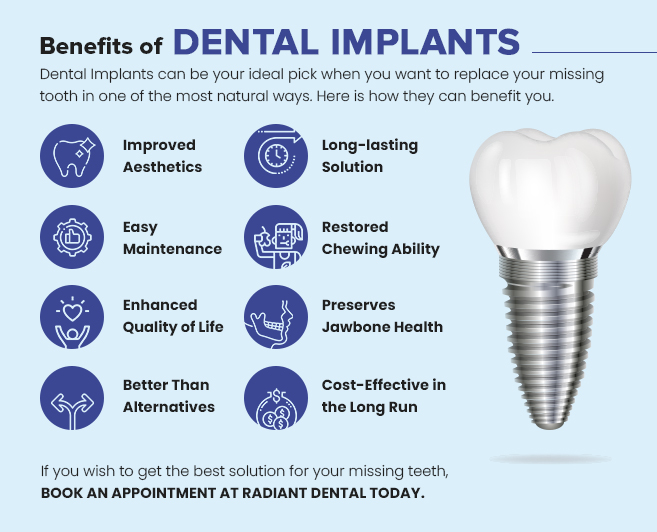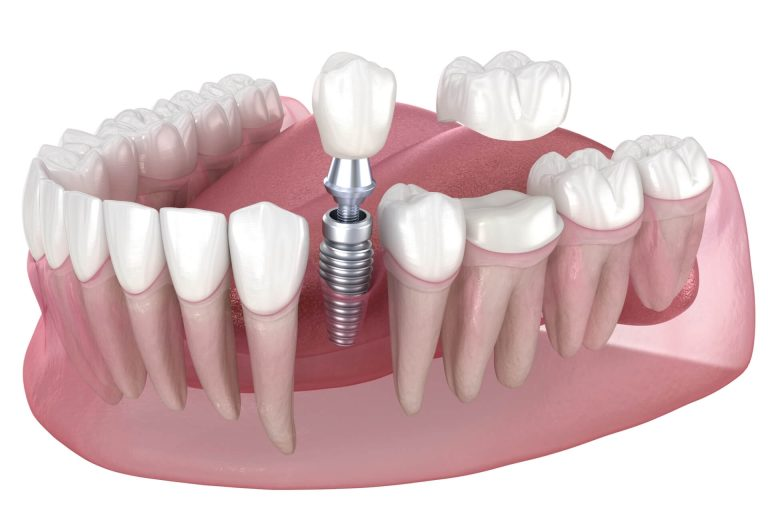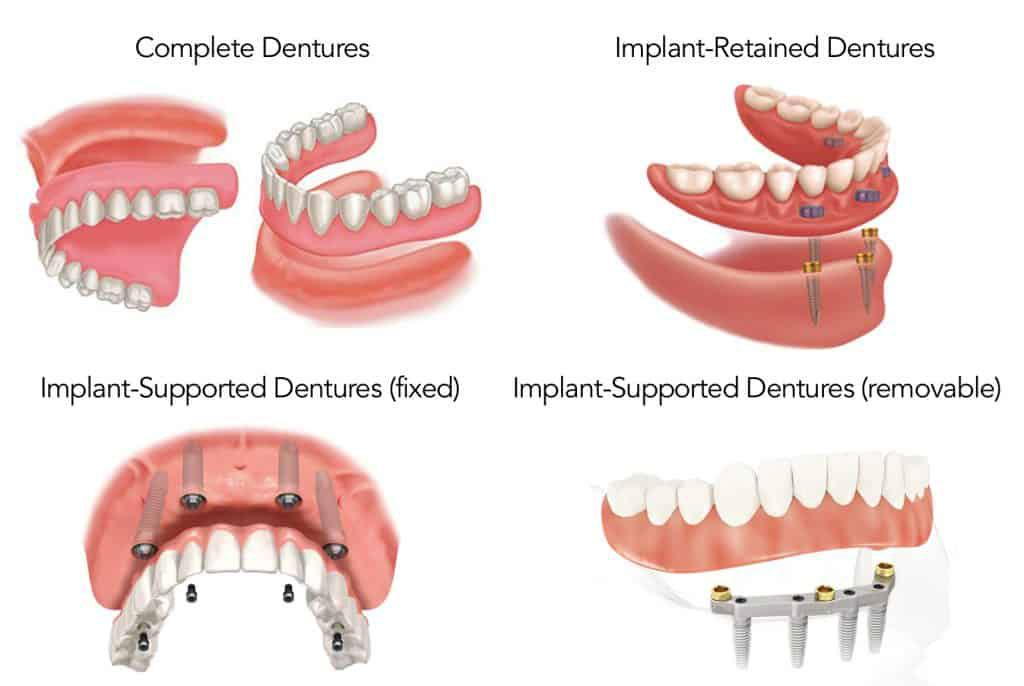Dental implants are a modern and effective solution for replacing missing teeth. They act as artificial tooth roots, providing a strong and stable foundation for crowns, bridges, or dentures.
How Dental Implants Work:
Surgical Placement: A titanium implant is surgically placed into the jawbone.
Osseointegration: Over several months, the implant fuses with the bone through a process called osseointegration.
Abutment Placement: Once the implant is fully integrated, a small connector called an abutment is attached to the implant.
Restoration: A custom-made crown, bridge, or denture is then attached to the abutment, completing the
restoration process.

Benefits of Dental Implants:
Natural Look and Feel: Dental implants look and function like natural teeth.
Improved Speech: Implants can help restore clear speech.
Enhanced Comfort: Unlike dentures, implants are securely anchored to the jawbone, eliminating discomfort and slippage.
Improved Eating: Implants allow you to enjoy a wider range of foods without worry.
Preservation of Jawbone: Implants stimulate the jawbone, preventing bone loss and maintaining facial structure.
Long-lasting: With proper care, dental implants can last a lifetime.

Who is a Good Candidate for Dental Implants?
Most healthy adults who have lost teeth due to injury, gum disease, or other factors are good candidates for dental implants. However, factors like bone density, overall health, and lifestyle can influence eligibility.
The Dental Implant Procedure:
The dental implant procedure typically involves multiple stages:
Initial Consultation: Your dentist will assess your oral health and discuss your treatment plan.
Implant Placement Surgery: The implant is surgically placed into the jawbone.
Healing Period: This period allows for osseointegration.
Abutment Placement: The abutment is attached to the implant.
Restoration: The final restoration (crown, bridge, or denture) is attached to the abutment.

Aftercare for Dental Implants:
Oral Hygiene: Maintain good oral hygiene practices, including brushing, flossing, and regular dental check-ups.
Avoid Hard Foods: Initially, avoid hard or chewy foods that could damage the implant or restoration.
Regular Dental Check-ups: Schedule regular dental check-ups to monitor the health of your implants.
If you're considering dental implants, consult with a qualified dentist to determine if they're the right solution for you.
This is for informational purposes only. For medical advice or diagnosis, consult a professional.
Implant-supported dentures, also known as implant overdentures, are a type of denture that is anchored to dental implants placed in the jawbone. This provides a much more secure and stable solution compared to traditional dentures, which rest solely on the gums.
Types of Implant-Supported Dentures:
Removable Implant-Supported Denture:
A denture that can be removed and cleaned.
It attaches to the implants using clips or attachments.
Provides better stability and retention than traditional dentures.
Suitable for patients who want a removable solution but desire more stability.
Fixed Implant-Supported Denture:
A denture that is permanently fixed to the implants.
Offers the highest level of stability and function.
Feels and functions more like natural teeth.
Ideal for patients who want a long-term, fixed solution.
Benefits of Implant-Supported Dentures:
Improved Stability and Retention: Implant-supported dentures are significantly more stable than traditional dentures, reducing slippage and discomfort.
Enhanced Comfort: The secure fit of implant-supported dentures eliminates the irritation and soreness often associated with traditional dentures.
Improved Eating and Speaking: With greater stability, you can enjoy a wider range of foods and speak more confidently.
Preservation of Jawbone: Implants stimulate bone growth, helping to prevent jawbone deterioration.
Enhanced Self-Confidence: A stable and natural-looking smile can boost your self-esteem.
The Implant-Supported Denture Procedure:
Dental Implant Placement: Surgical placement of dental implants into the jawbone.
Osseointegration: Healing period for the implants to fuse with the bone.
Abutment Attachment: Placement of abutments on the implants to connect the denture.
Denture Fabrication: Creation of a custom-made denture that attaches to the abutments.

Important Considerations:
Cost: Implant-supported dentures are generally more expensive than traditional dentures due to the implant placement and surgical procedures.
Healing Time: The healing process can take several months.
Oral Hygiene: Regular oral hygiene practices, including brushing, flossing, and professional cleanings, are essential to maintain oral health and the longevity of the implants.
If you are considering implant-supported dentures, it is important to consult with a qualified dentist to determine if you are a suitable candidate and to discuss the specific treatment plan that best suits your needs.
TYPES OF IMPLANT SUPPORTED DENTURES
IMPLANT BRIDGE
IMPLANT OVERDENTURE
IMPLANT HYBRID DENTURE
IMPLANT CERAMIC FULL MOUTH
ALL ON FOUR IMPLANTS PROSTHESIS
ALL ON SIX IMPLANTS PROSTHESIS
DIGITAL IMPLANTS (3 DAYS LOADING)


